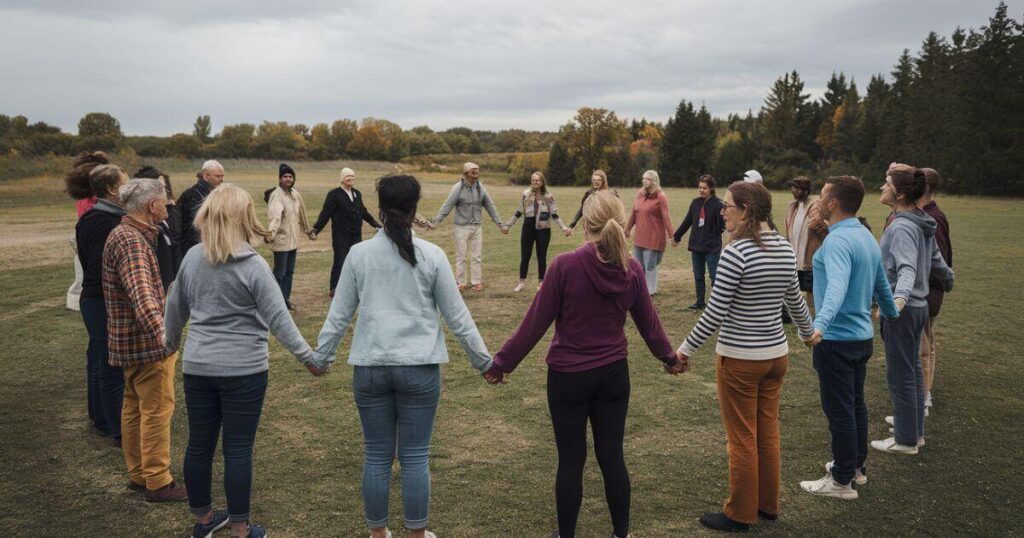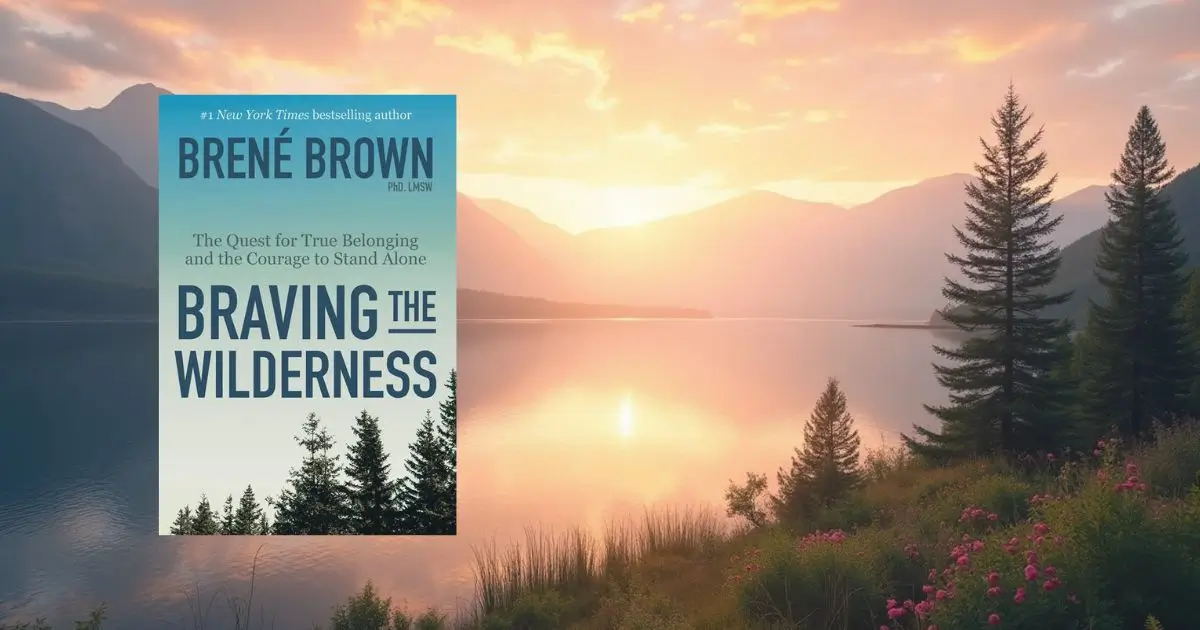“True belonging doesn’t ask us to change our true selves. It requires us to be who we are.” This powerful insight by Brené Brown stopped me in my tracks. Think about it: how often do we dare to stand firm in our authenticity in a world screaming for conformity?
I first came across Brené Brown’s work almost by chance. I stumbled upon her Netflix special The Call to Courage last month and found myself glued to the screen. Her blend of research and storytelling felt like a lifeline in a world drowning in shallow self-help advice. Naturally, I couldn’t wait to dive into her book Braving the Wilderness.
This isn’t your average feel-good read. Brown challenges the idea of belonging—reminding us that fitting in and true belonging are worlds apart. She argues that real connection starts with the courage to stand alone, especially in a society that thrives on division. It’s raw, thought-provoking, and will likely challenge everything you thought you knew about connection and community. Let’s unpack what makes Braving the Wilderness not just a book, but a blueprint for living authentically in a fractured world.
Table of Contents
What Is Braving the Wilderness About?
“True freedom comes when you realize you don’t belong to any one place—you belong everywhere, yet nowhere. The cost is steep, but the reward is immense.” Brené Brown begins Braving the Wilderness with a powerful quote from Maya Angelou, laying the foundation for a journey that is both challenging and empowering.
At its core, “braving the wilderness” isn’t about venturing into a literal forest. It’s about navigating the metaphorical wilderness of life—those moments when you feel utterly alone, disconnected, or out of sync with the world around you. In this book, Brown flips the idea of belonging on its head. True belonging, she argues, doesn’t come from fitting in or being accepted by others. Instead, it’s about having the courage to stand in your own authenticity, even when it’s uncomfortable.
True Belonging vs. Fitting In
Brown makes a crucial distinction: fitting in is about changing yourself to be accepted. True belonging is about embracing who you are without compromise. It’s daring, it’s courageous, and yes—it can be messy at times. She writes that to truly belong, you must be willing to stand alone when your values or truths don’t align with the crowd.
In today’s hyper-polarized world, this message feels more relevant than ever. Brown notes how social media and political divides have pushed people into ideological “factions.” It’s easier than ever to retreat into echo chambers where everyone looks, thinks, and acts the same. But this, she argues, only deepens feelings of loneliness and disconnection.

The Cost of Polarization
Brown’s research shows that loneliness has reached epidemic levels, with some studies suggesting it’s as harmful to your health as smoking 15 cigarettes a day. The cause? Increasing polarization, where people avoid meaningful conversations with those who hold different views. She challenges readers to lean into these uncomfortable spaces, writing, “People are hard to hate close up. Move in.”
Key Strategies for Braving the Wilderness
What does it mean to truly connect in a world that feels increasingly disconnected? Brené Brown breaks it down into four key strategies that aren’t just theoretical—they’re practical, actionable, and rooted in her research. These strategies in “braving the wilderness” are designed to help us navigate the polarization, loneliness, and ideological walls that define so much of modern life.
1. Move Closer to the People You Disagree With
It’s easy to demonize someone from a distance. But, as Brown writes, “People are harder to hate up close. Get closer.” This isn’t about compromising your values. It’s about challenging your own assumptions and seeing the humanity in others.
Try this: The next time you’re in a heated discussion, resist the urge to shut down or fight back. Instead, ask questions. Get curious about the “why” behind their perspective. You might not agree, but you’ll likely find common ground or at least a better understanding.
2. Speak Truth to Bullshit, But Stay Civil
Brown doesn’t mince words here. Standing up for what you believe in matters, but the how is just as important as the what. Civility isn’t a weakness; it’s a strategy for meaningful change.
When confronting misinformation or harmful ideas, focus on facts, not personal attacks. For example, instead of saying, “You’re wrong,” try, “I see it differently, and here’s why.” This keeps the door open for dialogue while maintaining your integrity.
3. Hold Hands with Strangers
This one might sound a bit abstract, but it’s deeply powerful. Brown highlights the importance of shared experiences—moments of collective joy or pain—as a way to rebuild connection and community.
Think about the last time you sang with a crowd at a concert or cheered with strangers at a sports game. Brown encourages us to create more of them, whether it’s volunteering, participating in local events, or simply sharing a smile with a neighbor.
4. Develop a Strong Back, Soft Front, and Wild Heart
This might be the most profound of all. A strong back means having the courage to stand tall in your convictions. A soft front means staying open, vulnerable, and empathetic. And a wild heart? That’s the willingness to embrace life’s uncertainties with authenticity and passion.
Here’s a challenge: Reflect on a time when you had to show both strength and vulnerability. How did it feel? What did you learn? Brown’s framework invites us to lean into that tension and grow from it.
In my opinion, The brilliance of these strategies lies in their simplicity and depth. They’re not about fixing the world overnight—they’re about small, intentional steps that lead to meaningful change. By practicing these approaches in your daily life, you’re not just “braving the wilderness”; you’re creating a path for others to follow.
These strategies remind us that connection isn’t about waiting for the perfect moment or person. It’s about showing up, even when it’s uncomfortable, and choosing courage over fear.

The BRAVING Acronym
Brené gives us a roadmap. Through the acronym BRAVING, she offers a practical framework to help us navigate the complexities of standing out while staying true to ourselves. These seven principles act as a compass for building trust, setting boundaries, and cultivating authentic relationships.
Here’s how each letter in BRAVING unfolds into actionable wisdom:
1. Boundaries: Protect Your Peace
Setting boundaries isn’t selfish—it’s necessary. Brown emphasizes that true belonging starts with self-respect, which means defining what’s acceptable for you and communicating it.
Here’s an example: If you’re constantly saying “yes” to things that drain your energy, practice saying “no” with kindness but firmness. Boundaries aren’t walls; they’re the fences that keep your garden flourishing.
2. Reliability: Do What You Say
People trust those who follow through on their commitments. Reliability is about more than just punctuality—it’s about showing up consistently and aligning your actions with your values.
Ask yourself: Are you overpromising and underdelivering? If so, focus on saying “yes” only when you’re sure you can follow through. It’s better to do less but with integrity, than to overcommit and fall short.
3. Accountability: Own Your Mistakes
Everyone makes mistakes. The true challenge lies in how we respond to them. Brown stresses that accountability means taking responsibility for our actions, apologizing when necessary, and learning from our mistakes.
Next time you slip up, resist the urge to make excuses. Instead, say, “I got this wrong, and here’s how I’ll make it right.” It’s a small step that builds enormous trust.
4. Vault: Keep It Confidential
Ever shared something personal only to have it spread like wildfire? Trust evaporates when people don’t respect confidentiality. The “vault” principle reminds us to treat others’ stories with the same care we’d want for our own.
If someone confides in you, lock it away. Don’t use it as gossip fodder. Trust is fragile, and respecting the vault is one way to keep it intact.
5. Integrity: Walk the Talk
Living with integrity is hard, especially when it’s uncomfortable. But as Brown points out, staying true to your values—even when no one’s watching—is the cornerstone of authenticity.
Here’s a question to ponder: Are your daily actions aligned with your beliefs? If not, what’s one small shift you can make today to live more in sync with your values?
6. Non-Judgment: Practice Compassion
Judgment blocks connection. Non-judgment means offering yourself and others grace. It’s about saying, “I see you’re struggling, and I’ve been there too,” instead of criticizing or shaming.
Brown highlights the importance of extending this mindset inward. Practice self-compassion when you falter. It’s hard to offer kindness to others if you’re not offering it to yourself.
7. Generosity: Assume the Best
Generosity isn’t just about giving resources—it’s also about assuming good intentions. Instead of jumping to conclusions, pause and consider a more charitable interpretation of someone’s actions.
For instance, if a friend doesn’t reply to your message immediately, don’t assume they’re ignoring you. They might just be busy. Choosing generosity over suspicion strengthens relationships and reduces unnecessary conflict.
You May Also Like: 15 Life-Changing Books List: Transform Your Mindset Today
Who Should Read Braving the Wilderness?
Not all books are for everyone, but “Braving the Wilderness” has a clear audience in mind. Brené Brown’s work resonates deeply with those navigating personal growth, seeking connection, or craving a more compassionate world. If you’re wondering whether this book is for you, here’s a breakdown of who stands to gain the most from its insights:
For Those Seeking Courage to Do What’s Right
Ever hesitated to stand up for what you believe in, fearing judgment or rejection? This book is for you. Brown’s call to embrace authenticity offers a practical roadmap for navigating those moments when the right choice feels like the loneliest one.
For Connection-Seekers Craving Community
Feel like the world is growing more disconnected? You’re not alone. With over 40% of Americans reporting feelings of loneliness today, compared to just 20% in 1980, Brown’s message of true belonging is more timely than ever. She challenges readers to build bridges rather than walls, cultivating deeper, more meaningful connections.
For Those Seeking to Understand “The Other”
In an era of division, this book encourages readers to lean into discomfort and engage with differing perspectives. It’s a reminder that connection doesn’t mean agreeing with everyone but instead embracing empathy and open-mindedness.
For the Outliers and Lone Wolves
If you’ve ever stood alone for your beliefs, you’ll find solidarity in Brown’s words. She celebrates the courage it takes to remain true to yourself, even when it means being the only voice in the room.
For Those Who Believe the World Needs to Change
Do you wish for a kinder, more compassionate society? Brown’s exploration of vulnerability and courage is a rallying cry for those ready to take action. It’s a call to be the change, starting with how we show up in our own lives.
For Anyone Struggling with Loneliness
Loneliness is a silent epidemic, but “Braving the Wilderness” offers hope. Through strategies like fostering genuine connection and practicing vulnerability, Brown provides tools to combat isolation and rediscover belonging.
Who Might Want to Skip This Book?
Love the world exactly as it is? Prefer the status quo over change? Then this book is not for you. Brown’s message is for those ready to challenge the norm, confront discomfort, and grow.
Final Thoughts
Braving the Wilderness is more than a book—it’s a guide for navigating the complexities of modern life with authenticity and courage. Brené Brown’s ability to weave storytelling with research creates a narrative that feels personal yet universally relevant. Her insights into loneliness, connection, and belonging hit hard, especially in a world that often seems more divided than united.
For me, the most powerful takeaway from Braving the Wilderness was the idea of standing alone without feeling lonely. It’s a reminder that true belonging doesn’t come from fitting in; it comes from showing up as your most authentic self, even when it’s uncomfortable. Her Braving the Wilderness acronym, in particular, is a tool I can see myself returning to again and again—a practical guide for building trust, both with others and within myself.
What else to read?
- Daring Greatly by Brené Brown
- The Gifts of Imperfection by Brené Brown
- Together: The Healing Power of Human Connection in a Sometimes Lonely World by Vivek H. Murthy
I review more books and novels, which you can explore in the books section.

